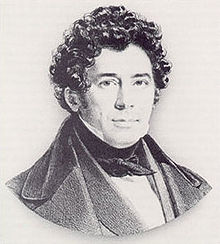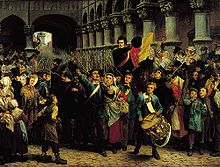- Charles Rogier
-
Charles Rogier 
Prime Minister of Belgium In office
9 November 1857 – 3 January 1868Monarch Leopold I
Leopold IIPreceded by Pierre de Decker Succeeded by Walthère Frère-Orban In office
12 August 1847 – 31 October 1852Monarch Leopold I Preceded by Barthélémy de Theux de Meylandt Succeeded by Henri de Brouckère In office
24 September 1830 – 25 February 1831
ActingPreceded by Position established Succeeded by Etienne Constantin de Gerlache President of the Chamber of Representatives In office
1 August 1878 – 13 November 1878Preceded by Xavier Victor Thibaut Succeeded by Jules Guillery Personal details Born 17 August 1800
Saint-Quentin, FranceDied 27 May 1885 (aged 84)
Saint-Josse-ten-Noode, BelgiumPolitical party Liberal Party Alma mater University of Liège Charles Latour Rogier (17 August 1800–27 May 1885) was a Belgian liberal statesman and a leader in the Belgian Revolution of 1830. He became Prime Minister of Belgium on two separate occasions: from 1847 to 1852, and again from 1857 to 1868.
Rogier descended from a family settled in the department of the Nord in France. He was born at Saint-Quentin. His father, an officer in the French army, perished in the Russian campaign of 1812. The family then moved to the Belgian city of Liege, where the eldest son, Firmin, held a professorship. Rogier studied law at the University of Liège (ULg) and was admitted to the bar. However, he devoted himself with greater zeal to journalistic campaigns against Dutch rule in Belgium. In 1824, in collaboration with his lifelong friends Paul Devaux and Joseph Lebeau, he founded the journal Mathieu Laensberg (afterwards Le Politique). With its ardent patriotism and its attacks on the Dutch administration, the journal soon achieved widespread influence.
On the outbreak of the insurrection at Brussels in August 1830, Rogier went there with a militia of about 300 citizens of Liège. In Brussels he gained recognition as one of the most active among the patriot leaders. He became a member of the provisional government established in October of the same year, and after the election of Leopold as King in June 1831, he was made Governor of Antwerp. During his first stint as Interior Minister, from 1832 to 1834, he brought into existence the Belgian railway system. From 1840 to 1841 he was Minister of Public Works and Education, and from 1861 to 1868 he served as Minister for Foreign Affairs.
Today, one of central Brussels' landmarks, the Place Rogier, commemorates his name.
Contents
Famous quotes
- La Belgique sera Latine ou elle ne sera pas.[1] — "Belgium will be Latin or it won't be."
- On establishing a French speaking government:
- Les premiers principes d’une bonne administration sont basés sur l’emploi exclusif d’une langue et il est évident, que la seule langue des Belges doit être le Français. Pour arriver à ce résultat, il est nécessaire que toutes les fonctions, civiles et militaires, soient confiées pour quelques temps à des Wallons; de cette manière les Flamands, privés temporairement des avantages attachés à ces emplois, seront contraint d’apprendre le Français et l’on détruira, peu à peu l’élèment germanique en Belgique.[2]
- — "The first principles of a good administration are based upon the exclusive use of one language, and it is evident that the only language of the Belgians should be French. In order to achieve this result, it is necessary that all civil and military functions are entrusted to Walloons and Luxemburgers; this way, the Flemish, temporarily deprived of the advantages of these offices, will be constrained to learn French, and we will hence destroy bit by bit the Germanic element in Belgium."
See also
Publications
- Descailles, Charles Rogier, 1800-85 (Brussels, 1896)
References
 This article incorporates text from a publication now in the public domain: Chisholm, Hugh, ed (1911). Encyclopædia Britannica (11th ed.). Cambridge University Press.
This article incorporates text from a publication now in the public domain: Chisholm, Hugh, ed (1911). Encyclopædia Britannica (11th ed.). Cambridge University Press.- This article incorporates text from an edition of the New International Encyclopedia that is in the public domain.
Political offices New office Prime Minister of Belgium
Acting
1830–1831Succeeded by
Etienne Constantin de GerlachePreceded by
Jean-François TielemansGovernor of Antwerp
1831–1840Succeeded by
Henri de BrouckèrePreceded by
Barthélémy de Theux de MeylandtPrime Minister of Belgium
1847–1852Preceded by
Pierre de DeckerPrime Minister of Belgium
1857–1868Succeeded by
Walthère Frère-OrbanPreceded by
Xavier Victor ThibautPresident of the Chamber of Representatives
1878Succeeded by
Jules GuilleryPrime Ministers of Belgium de Gerlache · Lebeau · de Muelenaere · Goblet d'Alviella · de Meylandt · Lebeau · Nothomb · Van de Weyer · de Meylandt · Rogier · de Brouckère · de Decker · Rogier · Frère-Orban · d'Anethan · Malou · Frère-Orban · Malou · Beernaert · de Burlet · de Smet de Naeyer · Vandenpeereboom · de Smet de Naeyer · de Trooz · Schollaert · de Broqueville · Cooreman · Delacroix · Carton de Wiart · Theunis · Van de Vyvere · Poullet · Jaspar · Renkin · de Broqueville · Theunis · van Zeeland · Janson · Spaak · Pierlot · Van Acker · Spaak · Van Acker · Huysmans · Spaak · G. Eyskens · Duvieusart · Pholien · Van Houtte · Van Acker · G. Eyskens · Lefèvre · Harmel · Vanden Boeynants · G. Eyskens · Leburton · Tindemans · Vanden Boeynants · Martens · M. Eyskens · Martens · Dehaene · Verhofstadt · Leterme · Van Rompuy · LetermeCategories:- Prime Ministers of Belgium
- Belgian politician stubs
- 1800 births
- 1885 deaths
- 19th-century Belgian people
- Belgian journalists
- Belgian Ministers of State
- Belgian people of French descent
- Liberal Party (Belgium) politicians
- Members of the National Congress of Belgium
- Order of Leopold recipients
- People from Antwerp (province)
- People from Saint-Quentin, Aisne
- Presidents of the Belgian Chamber of Representatives
- University of Liège alumni
Wikimedia Foundation. 2010.

